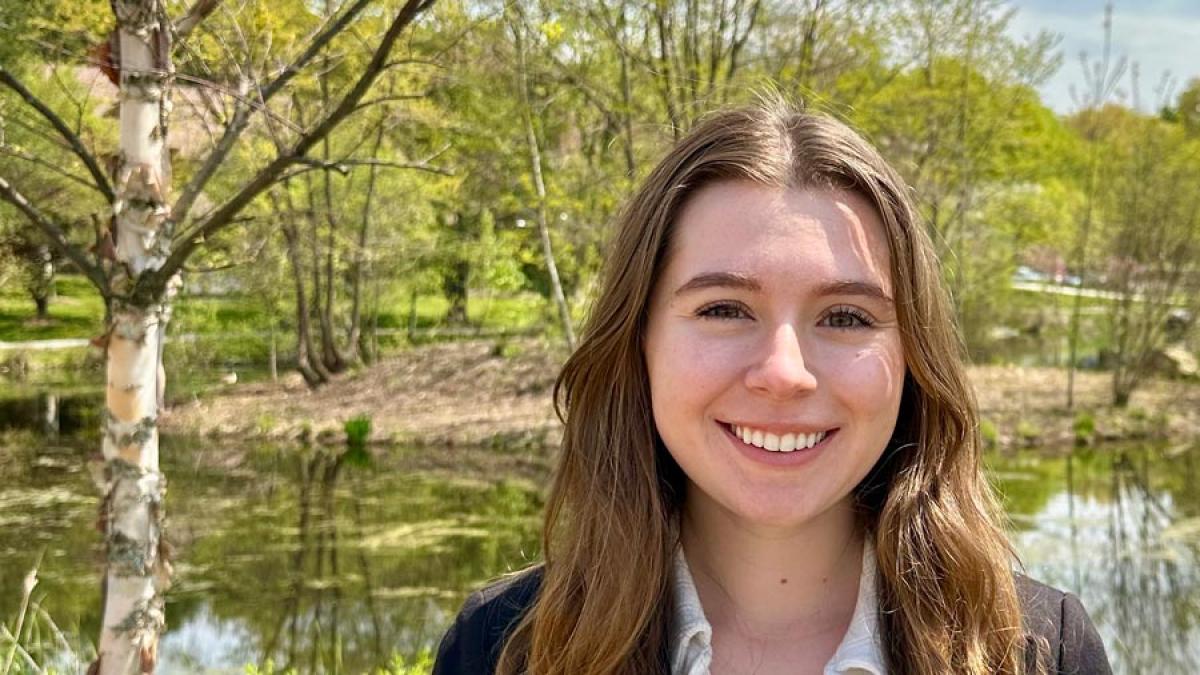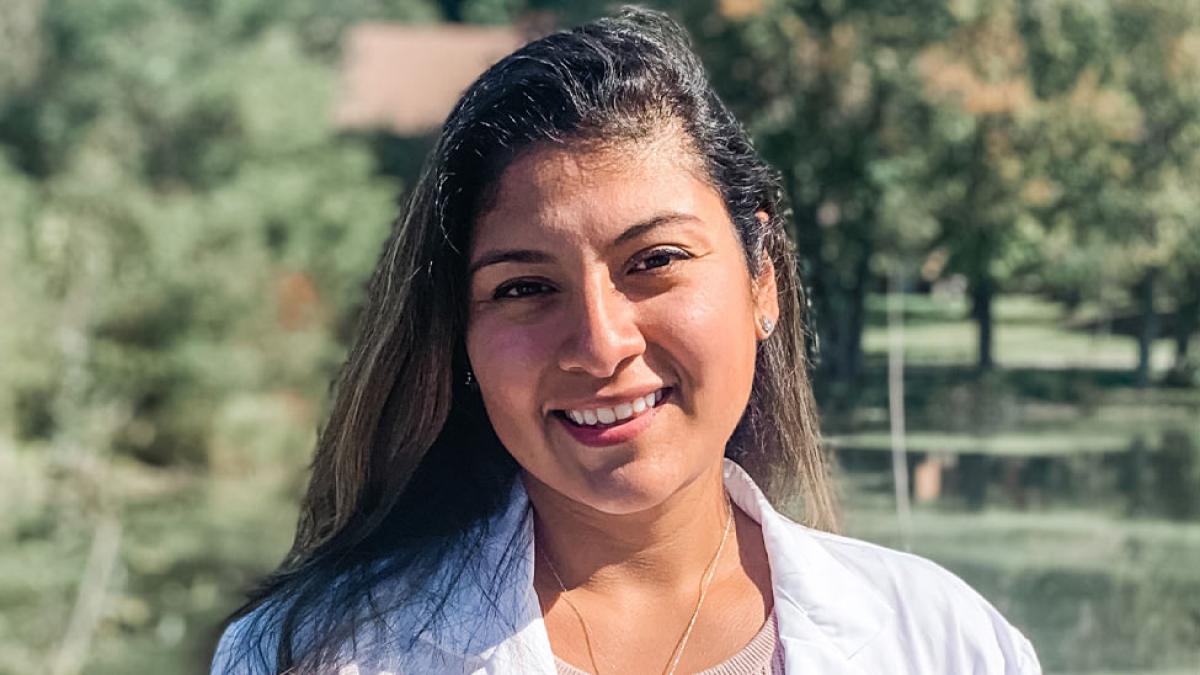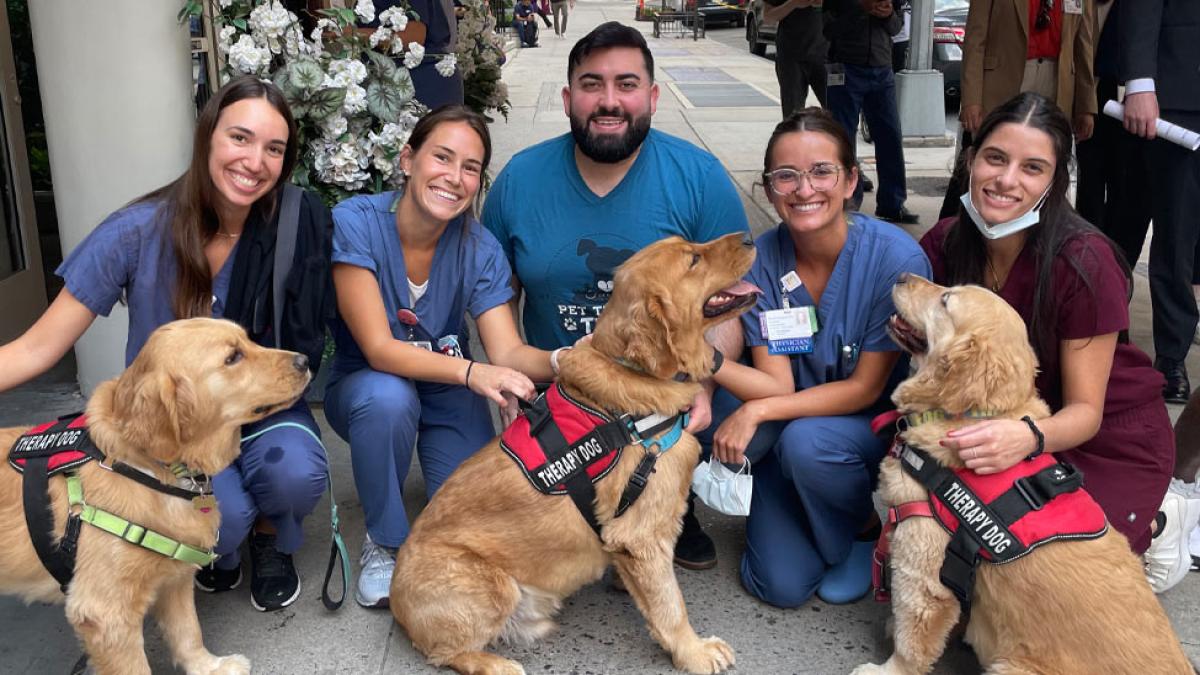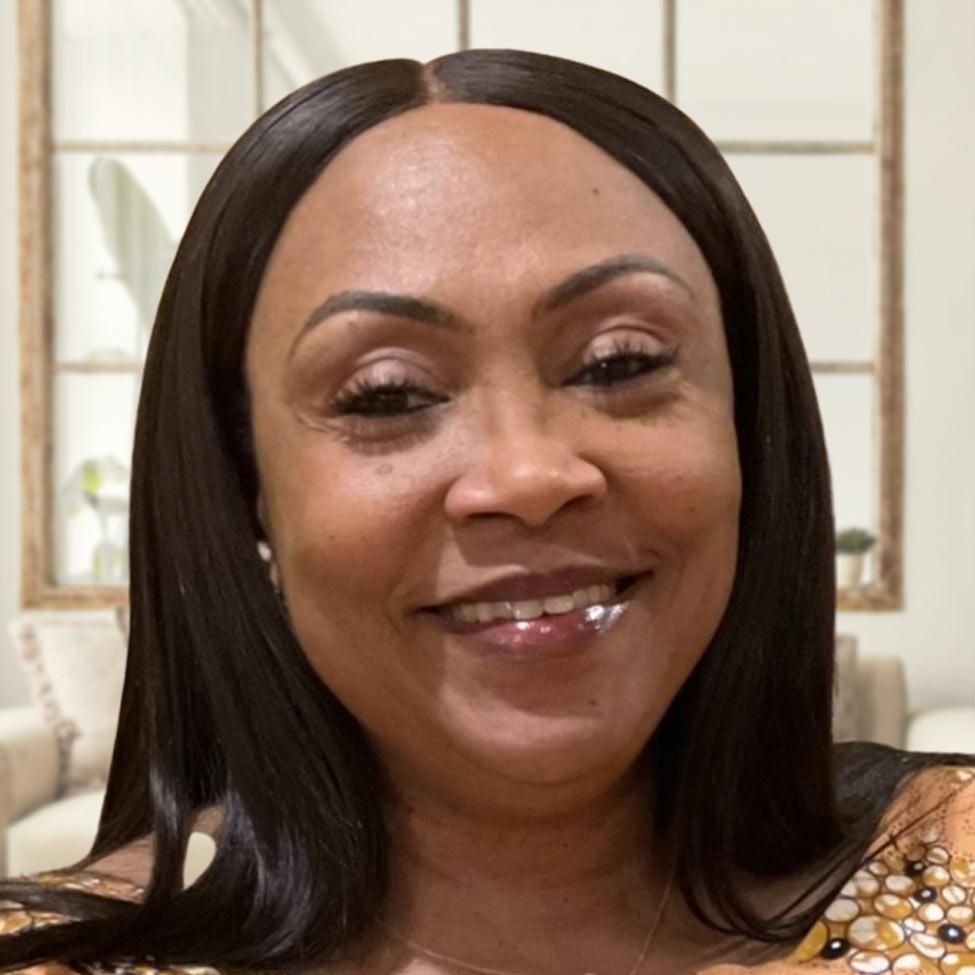
Triple Alumna Returns to Make it a Quartet
Dr. Onua explained that she continues returning to Pace because of the variety of programs that are offered; the knowledgeable and supportive faculty; and the excellent clinical placement opportunities that allow students to excel in the field.

Nothing says satisfaction more than a returning student. Edith Onua, DNP, RN, FNP-BC, is a shining example of how pleased students are with their experiences at the Pace University Lienhard School of Nursing (LSN).
After completing the RN to BS, Family Nurse Practitioner (FNP), and Doctor of Nursing Practice (DNP) programs at Pace, #Go-Getter Dr. Onua knew she was ready to take on more. Her career path and desire to help others brought her back to LSN for her fourth degree, a Master of Science in Psychiatric Mental Health Nurse Practitioner (PMHNP).
As an alumna that has already earned her doctorate degree, she explains why it was important for her to return for a second master’s degree. She has worked in correctional settings for several years and, “I have seen time and time again inmates that have mental health issues that were not taken care of in the community,” said Dr. Onua. These were the experiences that inspired her to begin the PMHNP program. She is passionate about ensuring there is accessible mental health care to as many patients as possible and wants to be able to identify and initiate prompt care to patients dealing with mental health issues. She is confident that the PMHNP program will provide her with the additional knowledge and skills to diagnose and properly care for patients who may be struggling.
Dr. Onua explained that she continues returning to Pace because of the variety of programs that are offered; the knowledgeable and supportive faculty; and the excellent clinical placement opportunities that allow students to excel in the field. “The Lienhard nursing department has wonderful faculty that are committed to raising the next and ongoing generation of nurses,” she said. “Pace offers exceptional support to their students and the nursing curriculum is one of the richest and best that I have come across.”
The Lienhard nursing department has wonderful faculty that are committed to raising the next and ongoing generation of nurses.
She advises other students to be the best they can be and to continue furthering their education with persistence while striving for the stars!
More From Pace
Alexa Slack’s resume speaks for herself—an exceptional GPA and a steadfast commitment to community service has enabled Alexa to graduate Pace intent on becoming a future leader in the public health space.
Peruvian and first-generation graduate Lauren Cordova, PA-S, ’22, is making a place at the table for herself and other students in underserved populations. She chose the Physician Assistant (PA) Pleasantville program in the College of Health Professions (CHP) because of the emphasis on cultural sensitivity, community service, and diversity and that it teaches the importance of representation in healthcare.
Nothing describes a #Go-Getter better then Pace University’s College of Health Professions (CHP) Lenox Hill Hospital Physician Assistant Program (PA-NYC) graduates.
Pace Unveils eSports Arena
Pace University has created an esports arena at 33 Beekman as a home for its varsity gamer athletes and as a future site to combine competition and academics. And because I have a kid who is actually a varsity esports athlete, I am adding this detail: Pace Esports’ Smash Gold 2 team won the ECAC Open Division Grand Finals earlier this year, with just one match loss while finishing in first place out of 76 teams in their division. Sweet.
Trump made a risky bet in tax fraud cases: report
“This is no small potatoes prosecution,” said Bennett Gershman, a professor at Pace University’s law school. “The parent company, as a felon, could be barred from having contracts with government agencies, and it could make it more difficult to do business with banks. This is a big deal."
NYPD officer files lawsuit aimed at changing Nassau County police hiring process
"If you look past the exam, at every stage the percentage of African Americans that are failing the process woefully exceeds the percentage of white citizens who are not," says Randolph McLaughlin, Pace University law school professor.
India emerging as major global player in edu sector: Pace University president
President Marvin Krislov is quoted in The Hindustan Times about the large increase in students from India attending U.S. colleges.
Food Law Leaders Call for Systems Change through 2023 Farm Bill
The Farm Bill Law Enterprise (FBLE) recently published five reports that seek to infuse new ideas and amplify calls to action ahead of negotiations for the next farm bill. The reports focus on five areas of action for the forthcoming bill: Climate & Conservation, Equity in Agricultural Production & Governance, Farm Viability, Farmworkers, and Food Access & Nutrition.
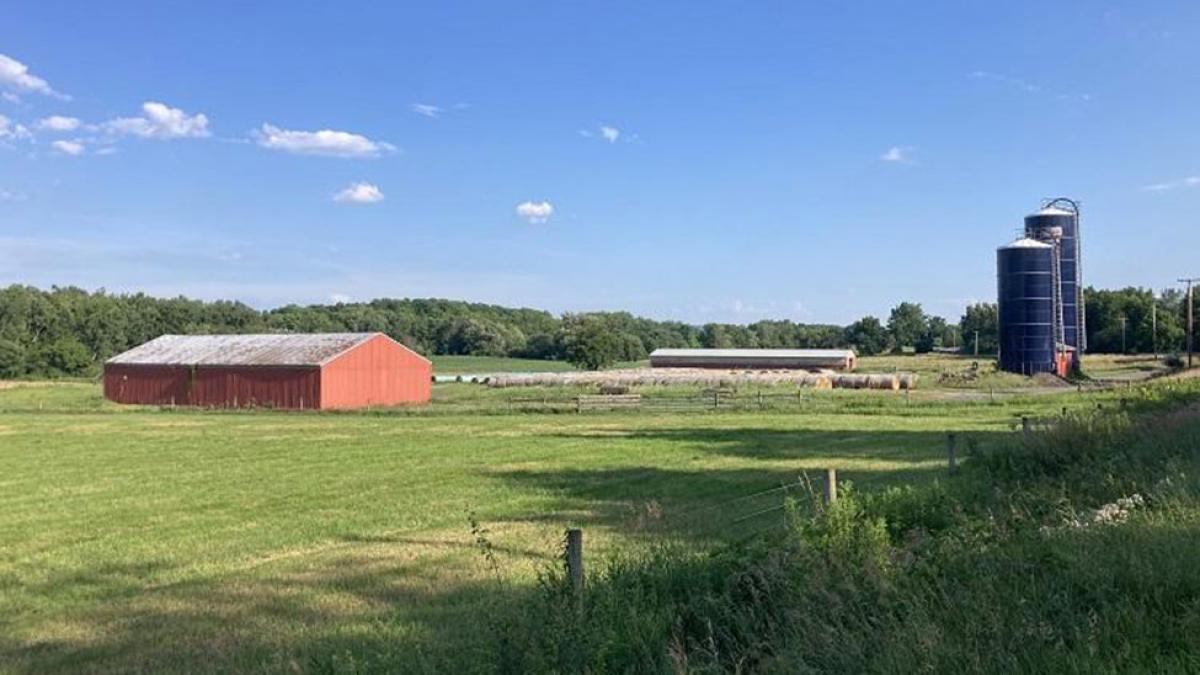
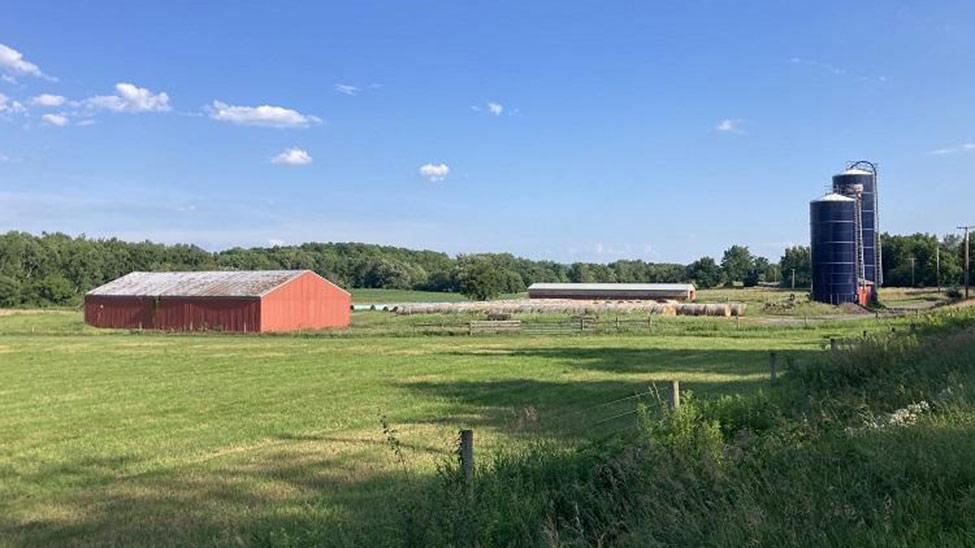
The Farm Bill Law Enterprise (FBLE) recently published five reports that seek to infuse new ideas and amplify calls to action ahead of negotiations for the next farm bill. The reports focus on five areas of action for the forthcoming bill: Climate & Conservation, Equity in Agricultural Production & Governance, Farm Viability, Farmworkers, and Food Access & Nutrition.
FBLE is a national partnership of law school programs working toward a farm bill that reflects the long-term needs of our society, including economic opportunity and stability; public health and nutrition; climate change mitigation and adaptation; public resources stewardship; and racial and socioeconomic justice. New farm bills only happen every five years, and the current farm bill, passed in 2018, expires in September 2023. While legislative hearings on some farm bill programs have already begun, further hearings as well as the drafting and negotiation of the bill are anticipated to begin in the new year for the legislation to pass in 2023.
“As we focus national attention on strategies to address hunger, nutrition, and health through the White House Strategy released last week, the farm bill will a key pathway for reforming our food system,” says Emily Broad Leib, FLPC’s Director and an author on FBLE’s reports. “We’ve come together as legal scholars, practitioners, and students to think critically about the role farm bill policy can play in creating a food system that is equitable and sustainable.”
Each new report by FBLE outlines goals and recommendations, with specific legislative actions that should be taken to achieve those objectives. The recommendations are designed to build on recent momentum to make equity a core value in USDA programming, uplift the voice of workers in the farming system, ensure access to nutritious food for all Americans, support the viability of small and mid-sized farms and local food systems, and make the U.S. agricultural system part of the climate change solution. The reports can be found at Farm Bill Law.org.
“The Farm Bill is such critical legislation, shaping the experiences of food consumers, food producers, and food system workers alike,” says Margot Pollans, Professor of Law at the Elisabeth Haub School of Law and Faculty Director of the Pace Food Law Center. “But for such a long time it did not get the attention that it deserved from the legal academic community. I’m honored that so many Pace students and faculty are contributing to this important effort to correct this blindspot and to offer ideas for a more sustainable and equitable food future.”
FBLE’s recommendations aim to provide a starting point to generate further discussion about the best solutions for achieving common goals. Many stakeholders, communities, and organizations will have thoughts, constructive critique, and perspectives to offer that should ultimately shape the policies enacted in the farm bill. FBLE is eager to collaborate with other stakeholders to further develop and refine these ideas and set priorities for the coming farm bill cycle.
In addition to these Reports, FBLE maintains educational materials and an active blog on its website. FBLE will be tracking the bill’s development and progress on the website through its passage.
FBLE members include law school programs with expertise in food, agriculture, public health, and environmental law, including: Drake University Law School, Agricultural Law Center; Duke Law School, Environmental Law and Policy Clinic; Harvard Law School, Emmett Environmental Law and Policy Clinic; Harvard Law School, Food Law and Policy Clinic; Harvard Law School, Health Law and Policy Clinic; Elisabeth Haub School of Law at Pace University, Food Law Center; UCLA School of Law, Resnick Center for Food Law and Policy; University of Maryland Francis King Carey School of Law, Environmental Law Program; and Vermont Law and Graduate School, Center for Agriculture and Food Systems. The Harvard Law School, Food Law and Policy Clinic coordinates and leads the initiative.
The Pace Food Law Center at the Elisabeth Haub School of Law supports legal services and advocacy, academic scholarship, and student learning. The Center’s legal services and advocacy projects support the transition to a just and sustainable food system by providing direct legal services to small farm and food businesses and related nonprofits through the Food and Farm Business Law Clinic, offering focused legal training, and advocating for systemic policy changes at the local, state, regional, and federal levels. The Center supports the development of food law scholarship, seeking to advance understanding of the role of law in shaping the food system. And in all its programming the Center offers opportunities for students to engage in food law, including through coursework, clinical work, externship placements, career counseling, and research opportunities.
Haub Law’s Advocacy Team Advances to Semi-finals at Prestigious NYCBA National Moot Court Regional Competition
The Elisabeth Haub School of Law’s Advocacy Team advanced to the semi-finals at the prestigious National Moot Court Regional Competition held November 17, co-sponsored by the New York City Bar Association and the American College of Trial Lawyers. Haub Law students Francine Michel (3L) and Kathryn Facelle (3L) represented Haub Law in the regional competition held at the New York City Bar Association, advancing to the semi-finals and placing among the top 4 teams. Notably, the team’s brief was ranked fifth out of the entire competition as well. The Haub Law team was coached by Adjunct Professor Jennifer Arlin.
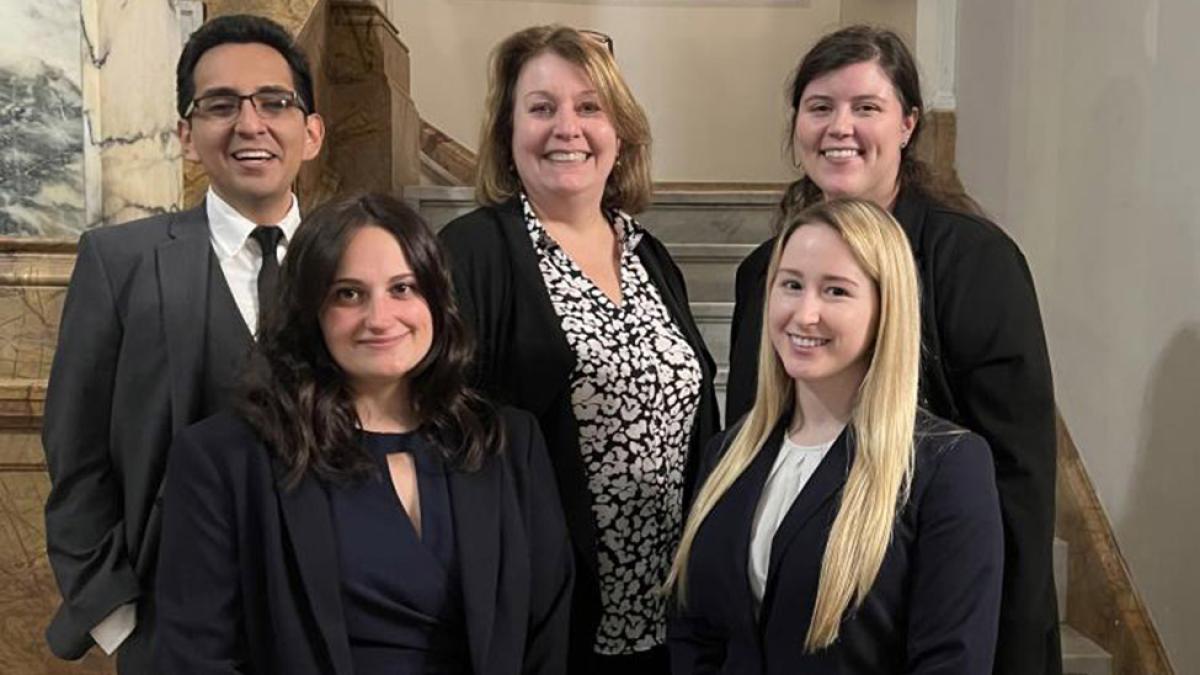
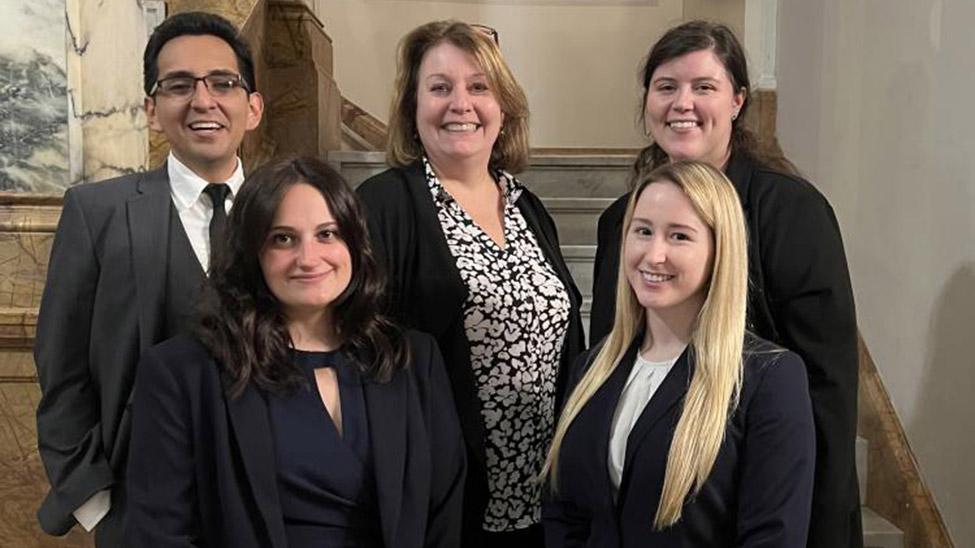
The Elisabeth Haub School of Law’s Advocacy Team advanced to the semi-finals at the prestigious National Moot Court Regional Competition held November 17, co-sponsored by the New York City Bar Association and the American College of Trial Lawyers. Haub Law students Francine Michel (3L) and Kathryn Facelle (3L) represented Haub Law in the regional competition held at the New York City Bar Association, advancing to the semi-finals and placing among the top 4 teams. Notably, the team’s brief was ranked fifth out of the entire competition as well. The Haub Law team was coached by Adjunct Professor Jennifer Arlin.
“We were honored to participate in this intense competition,” said Haub Law Trial Advocacy Team Member, Kathryn Facelle. “I am proud of what we accomplished and we could not have advanced as far as we did without the support of the entire Haub Law Trial Advocacy team and our coach.”
The National Moot Court Competition is an annual inter-law school event designed to promote the art of appellate advocacy. “The success of our team is a tribute to their hard wok, exceptional skill and committed coaching,” said Director of Advocacy Programs at Haub Law, Louis V. Fasulo. “Professor Arlin’s leadership has helped us to elevate the skills of all the students in our moot program. We are competing with the best and I am so proud of how our Program continues to evolve.”
Legal Hand Call-In Center Serving Westchester County to Open at the Elisabeth Haub School of Law at Pace University in January 2023
The Elisabeth Haub School of Law at Pace University has partnered with Legal Hand, Inc., a New York State not-for-profit corporation, to launch the Legal Hand Call-In Center serving Westchester County. The virtual center will be staffed and operated by the Elisabeth Haub School of Law at Pace University and is planned to open for Visitors in the new year.


The Elisabeth Haub School of Law at Pace University has partnered with Legal Hand, Inc., a New York State not-for-profit corporation, to launch the Legal Hand Call-In Center serving Westchester County. The virtual center will be staffed and operated by the Elisabeth Haub School of Law at Pace University and is planned to open for Visitors in the new year.
The Legal Hand Call-In Center will be an all-virtual resource center for community members, with office space on the third floor of Aloysia Hall at the Law School. Haub Law students, along with college students and community Volunteers, will be trained to assist those who live, work and send children to school in Westchester by phone and online and provide legal information, assistance and referrals. While the Center will not provide legal advice or representation, it will serve as a valuable resource for community members seeking guidance in areas such as employment, housing, family, immigration, domestic violence and public benefits.
The Legal Hand Call-In Center serving Westchester County will function as part of the law school’s broader Access to Justice Project, which incorporates curricular, experiential, research, and policy advocacy components, all designed to increase student, faculty and staff engagement in pro bono and community work, and to support the local community in addressing justice gaps.
“Through our partnership with Legal Hand, the Elisabeth Haub School of Law will serve an important role as a resource for the community, while providing our students with an invaluable opportunity to understand and address access to justice issues,” said Horace E. Anderson, Dean of the Elisabeth Haub School of Law. “The Center’s goals are to empower both Volunteers and Visitors to understand and navigate issues and self-help resources, and to help Visitors resolve issues before they turn into legal action.”
Law student Volunteers will be able to participate by handling shifts during the Center hours as trained Volunteers or through a guided externship for credit, and members of the broader community will be trained as Volunteers and asked to commit to serving a minimum of 3 hours per week for 6 months.
“The Legal Hand Call-In Center partnership is an exciting addition to our Access to Justice Project, which is all about finding innovative ways for our law students to build skills through actual community engagement in identifying and addressing gaps in access to legal information and resources,” said Adjunct Professor Elyse Diamond, Director of the Public Interest Law Center and Access to Justice Project. Professor Diamond is spearheading the Call-In Center partnership and launch, and will serve as the faculty advisor for Haub Law students participating in the program.
With the addition of the forthcoming Legal Hand Call-In Center, Haub Law recently appointed Stephanie Costa, Esq. as the Legal Hand Call-In Center Attorney. In this new role, reporting to Professor Diamond, she will train and supervise the law student and community Volunteers in the Legal Hand Call-In Center operated by Pace as they assist virtual Visitors. Prior to joining Haub Law, Stephanie litigated cases on tenants’ rights and fair housing issues on behalf of individual New Yorkers and tenant associations at Legal Services-NYC. She received her JD at Fordham University School of Law and undergraduate degree at the University of Pennsylvania. Diego Gomez, a 2022 graduate of the law school, has also been hired as the Center Manager and will assist in the Center’s training and administration.
Haub Law is currently recruiting students and other interested members of the community as Volunteers. Qualifying Volunteers will participate in an intense training program prior to the planned launch of the Center in January 2023.
